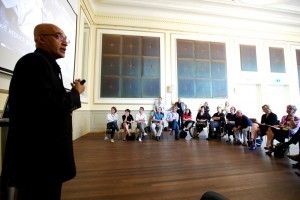3 Tricks to Surviving a Public Speaking Event
You know what I find interesting? That statistic claiming that more people are afraid of public speaking than of anything else in the world. I mean, the everyday person would rather be trapped in a cave, touch a spider, or be chased by clowns than address a crowd.
But in today’s market, visibility is huge. Somewhere between 600,000 and 1 million books were self-published last year IN THE US ALONE. For readers to know about our books, we’ve got to get out there and be seen. And that means book signings, school visits, library engagements, speaking at conferences, etc. If the mere thought makes you break out in hives, take a deep breath, because Rachel Amphlett is here to share 3 simple tips for surviving any public speaking event. IT CAN BE DONE, PEOPLE!

Sebastiaan ter Burg @ Creative Commons
Most writers I know, myself included, are quite happy in their own little worlds. We might venture out to go to work, socialize with friends, or do the shopping but we’re never happier than when we’re tucked away daydreaming or scribbling down frantic notes for our current works in progress.
The problem is, when we are required to do public speaking, we’re simply not equipped for it. In fact, we’re terrified. So, how do you go from happy introvert to confident extrovert, even if it’s just for a few minutes?
Prepare Yourself
You’re probably going to be asked to read an excerpt from your latest work. The trick here is to read it out aloud on your own a couple of times during the week leading up to the event.
Talking out loud is a lot different to talking in your head. You’ll spot the words you’re likely to trip over, you’ll discover a whole new meaning to ‘pacing’ and, more importantly, you’ll find the places where you can come up for air.
Yes, remember to breathe – please. We don’t want you passing out from lack of air.
Know Your Audience
The first public talk I ever did with regard to my writing was in a library, on a Saturday morning, to two people. Yes, two.
I was still scared. These lovely ladies had read about my first novel in the local paper and had decided that they’d better come along to see what I had to say for myself.
I quickly realised it would be ridiculous if I insisted on standing and pacing about in front of them, so instead we pulled up a little circle of chairs and I started off by explaining how I decided to write a book. Before I knew it, a whole hour had gone by, two of the library employees had joined us, and they’d all grabbed details of how to download my book (it was only available as an eBook at the time, and the library still supported me, thank goodness), and we’ve exchanged emails since that time.
Sitting down and being at the same level as my audience meant we were a lot more approachable to each other – the gesture broke down any ‘us and them’ barriers that might have otherwise been in place, and led to a much better engagement. And I realized that they weren’t so scary after all.
The key here is to size up your audience and adjust your presentation, if necessary. Are the guests talkative and chatty? Engage them with questions. Are people taking lots of notes? Slow down the tiniest bit to allow them time to write. Reading your audience is hugely helpful in allowing you to tailor your presentation to their needs, which can make for a more successful event.
Take Your Time
For the life of me, I can’t remember where I learnt this trick, but trust me – it works. Whatever the occasion, when it’s your turn to stand up in front of an audience, make them wait.
Not too long, though. By taking your time, I mean walk up to the podium, stage or whatever speaking platform has been set up, and either open the book and run your gaze over the first few sentences, or adjust the microphone. Adjusting the microphone is my favorite trick. Personally, I haven’t got an excuse, because at six foot tall I usually tower over my host anyway, but it’s a fantastic way to prepare for public speaking.
When I was asked to read an excerpt from my first book at an international thriller author’s book launch, I adjusted the microphone, looked up at the audience, and asked if they could hear me okay. A few people at the back called out that they could, and off I went. Those precious few seconds allowed me to:
• Get my breathing under control
• Eyeball my audience
• Engage with my audience, and prepare them (and me!) for the sound of my voice
Hopefully the above tips will help ease your nerves leading up to your moment in the spotlight. If public speaking is something you’d like to develop, there are several groups you can join, Toastmasters being the obvious choice, and one I’ve participated in a couple of times. I found them to be incredibly supportive and attentive listeners and the feedback is invaluable. Often, the hurdle is getting used to your own voice, but once you’ve done that, you’ll be well on your way to being a confident public speaker, even if it’s just for a few minutes.
 Rachel Amphlett previously worked in the UK publishing industry, played lead guitar in rock bands, and worked with BBC radio before relocating from England to Australia in 2005. After returning to writing, Rachel enjoyed publication success both in Australia and the United Kingdom with her short stories, before her first thriller White Gold was released in 2011. Her Dan Taylor thrillers (White Gold
Rachel Amphlett previously worked in the UK publishing industry, played lead guitar in rock bands, and worked with BBC radio before relocating from England to Australia in 2005. After returning to writing, Rachel enjoyed publication success both in Australia and the United Kingdom with her short stories, before her first thriller White Gold was released in 2011. Her Dan Taylor thrillers (White Gold  and Under Fire
and Under Fire ) and her latest standalone thriller, Before Nightfall
) and her latest standalone thriller, Before Nightfall , are all Amazon bestsellers. Currently, two further independent projects are in draft stage, while a third Dan Taylor thriller is being researched. You can keep in touch with Rachel via her mailing list, Facebook, and Twitter.
, are all Amazon bestsellers. Currently, two further independent projects are in draft stage, while a third Dan Taylor thriller is being researched. You can keep in touch with Rachel via her mailing list, Facebook, and Twitter.
The post 3 Tricks to Surviving a Public Speaking Event appeared first on WRITERS HELPING WRITERS.
Writers Helping Writers
- Angela Ackerman's profile
- 1014 followers



